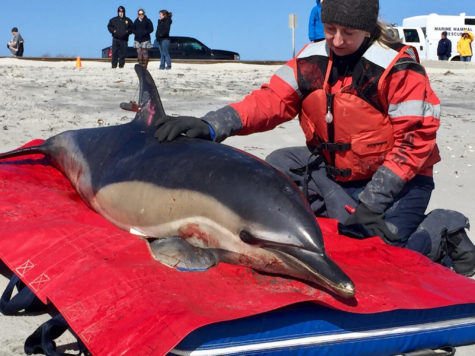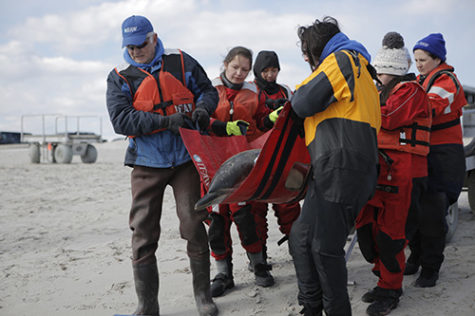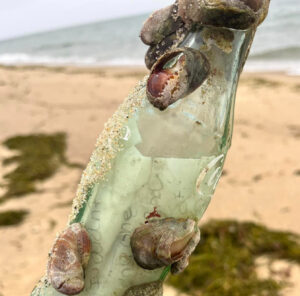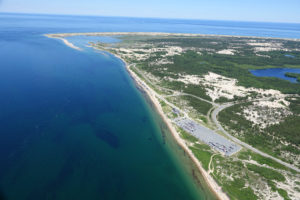WEST DENNIS – A team from the Yarmouth Port-based International Fund for Animal Welfare rescued 7 dolphins that stranded in Wellfleet early Friday morning and released them successfully at West Dennis Beach in Dennis.
IFAW spokesperson Kerry Branon said staff from the Wellfleet Harbormaster’s office and Wellfleet shellfish divsion helped extricate the dolphins from a muddy section of the Herring River. They responded to the scene just before 8 a.m.
The dolphins were loaded into the IFAW rescue trailer and brought to Dennis.
Branon said 2 of the 7 dolphins that were released were pregnant. An eighth dolphin that stranded near Linnell Landing in Brewster Friday had to be humanely euthanized.
The cause of Friday’s stranding was unknown.
This is the latest of several dolphin strandings that IFAW has responded to since the beginning of the year. The blog posted below was written just 2 days ago by IFAW’s Brian Sharp, Manager of Marine Mammal Rescue and Research. It details the extensive efforts IFAW has been involved in over the past several weeks.
Blog from Brian Sharp
Marine mammal strandings in 2017 have been unusually high for the International Fund for Animal Welfare’s (IFAW) Marine Mammal Rescue and Research team.
In the last week, IFAW deployed to seven separate mass strandings (a stranding of two or more marine mammals).
The first call on February 22 reported five stranded common dolphins at the Massachusetts Audubon Nature Reserve in Wellfleet, Massachusetts. The IFAW team, volunteers and staff from the Massachusetts Audubon Society responded to rescue the animals.
Four dolphins were examined and moved to Herring Cove in Provincetown, where they were released. Unfortunately, one of the smallest animals was severely malnourished and in poor health. After a thorough physical examination, the difficult decision was made by IFAW’s responding veterinarian to humanely euthanize the animal due to his poor prognosis.
Two days later, two harbor porpoises stranded at Duck Creek, also on the bay side in Wellfleet. Our IFAW team does not typically see mass stranded harbor porpoises, however, occasionally they are found in pairs. One porpoise had stranded on shore and the other was swimming in shallow water. IFAW worked with the Wellfleet Harbormaster to herd the swimming animal out to deeper water. The larger of the two animals was rescued and assessed for overall health. After an ultrasound exam was performed, our staff determined she was pregnant.
She was carefully released in Duck Harbor, where she had good, quick access to deep water.
Hours later the second harbor porpoise stranded. IFAW’s rapid response and quick health assessment allowed the porpoise to be transported and released near the same area the first porpoise was released, in the hopes that the two animals would rejoin and swim out of the area.
In the midst of the porpoise responses, the team received another hotline report of two common dolphins at Chapin Beach, Dennis. Our team rushed to the scene to provide care to the surviving dolphin. After recovering the lone dolphin, a health assessment was performed and the animal was cleared for release at a beach with open water access.
The next morning, seven more common dolphins were reported swimming in the shallow waters of Loagy Bay in Wellfleet. The tide was going out, and the IFAW team attempted to herd the animals to safety in deeper water. The attempt was ultimately unsuccessful and the dolphins stranded on the mud flats. Unfortunately, two dolphins died shortly after they stranded before rescuers could recover them. The other five were rescued and assessed for injuries and illness. Among the five rescued dolphins were a mother and calf.
The team made sure the mother and calf were kept close together throughout the response. The remaining dolphins were positioned so they could see each other. The dolphins could be heard communicating through clicks and whistles during the rescue. After receiving veterinary care and treatments during transport all five, including the mother and calf, were released and swam off well.
On Sunday morning, four dolphins were found stranded off Dyer Prince in Eastham. One was dead on arrival, the other three were rescued, and assessed for health. Ultimately, predation by gulls resulted in wounds too severe to overcome in one young animal. That dolphin was humanely euthanized. IFAW advises those who find stranded dolphins to keep gulls away because they will attack the eyes, blowholes and other soft tissue. The remaining two were released at Scusset Beach in Sandwich, Massachusetts.
On Monday, an additional two rescues occurred: Two in a shallow creek were reported in the morning, and five more stranded in the afternoon. The two dolphins (another mother and calf) in the creek were herded by our team using boats and pingers (acoustic deterrents that emit a sound to encourage the dolphins to move away). Initially the herding was successful, moving the pair out of the creek but as the tide dropped, they stranded. The team responded immediately and the mother and calf were treated for shock and transported for release.
Three of the five dolphins that stranded in the afternoon died shortly after stranding but the remaining two were transported to a release site. The five animals from two different sites were released together and were last seen heading out to sea as a group. Our IFAW team has performed at maximum capacity during this week, leaning heavily on the network of volunteer responders.
Due to the high number of stranded animals, our team of experts is investigating each event and hopes to know more once results from clinical test are received. Cape Cod is a global hot spot for dolphin mass strandings, and IFAW has vast experience in responding to these events. Unlike strandings in recent years, these recent events appear to be somewhat different.
One significant difference is that these dolphins are primarily females with calves, versus the norm over the last decade of a high proportion of young males. These females and calves seem to be exhibiting higher levels of stress and shock, and many are not surviving the initial physical impacts of the strandings like dolphins have in previous years.
There are a variety of reasons that factor into what causes dolphins to strand and the exact causes in these cases remains unknown.


























